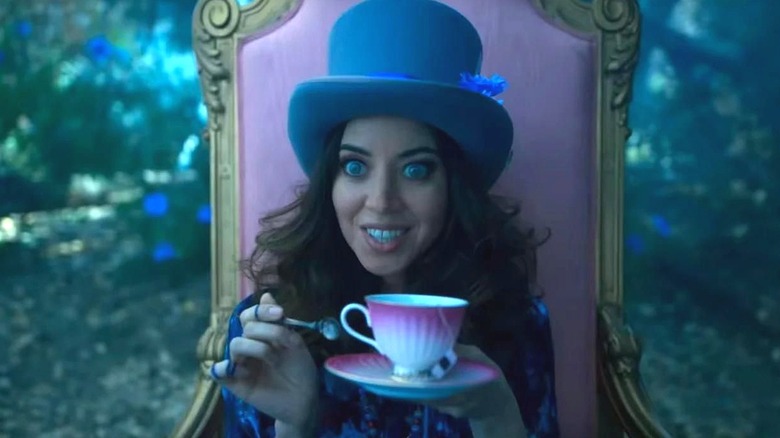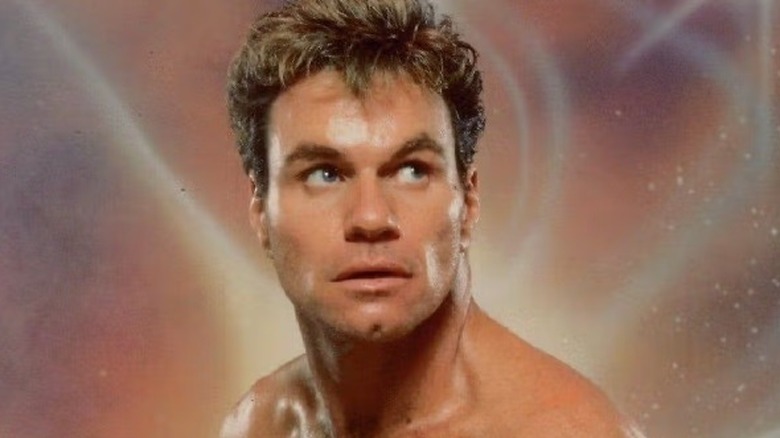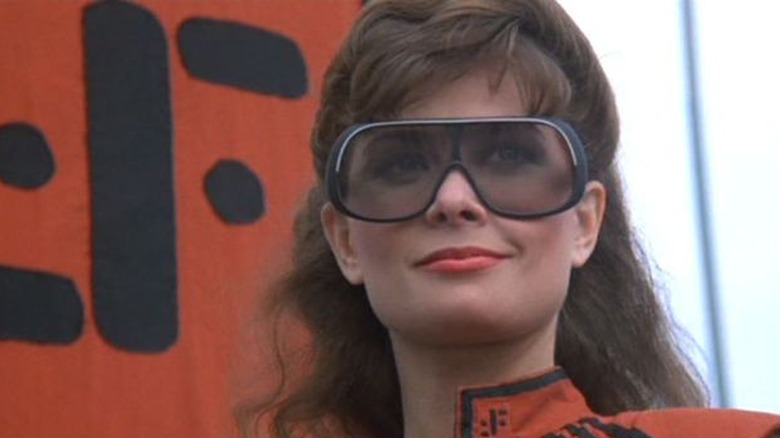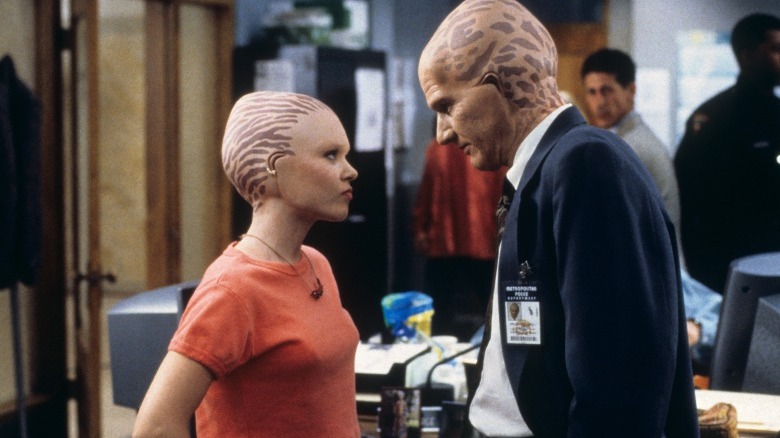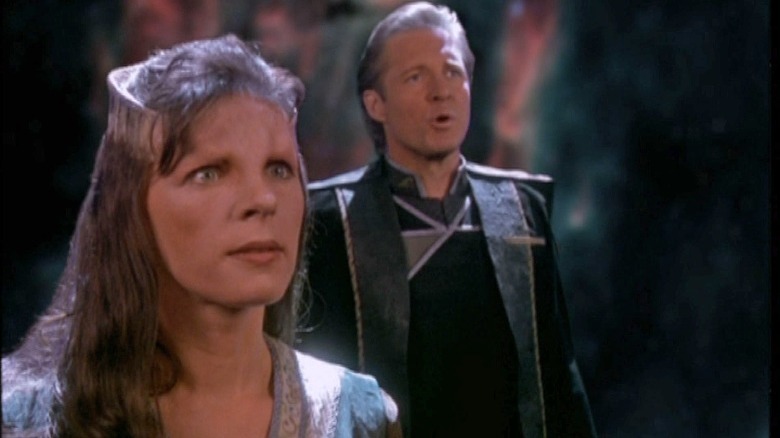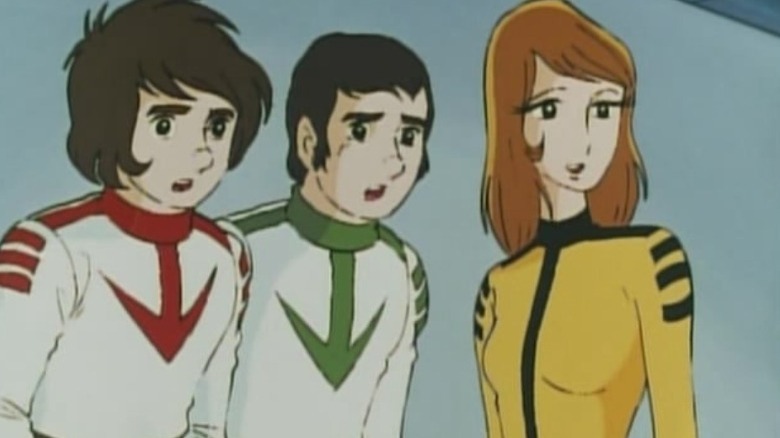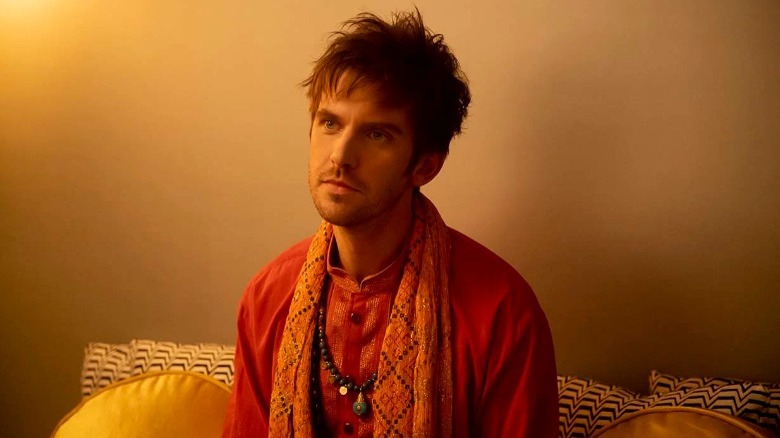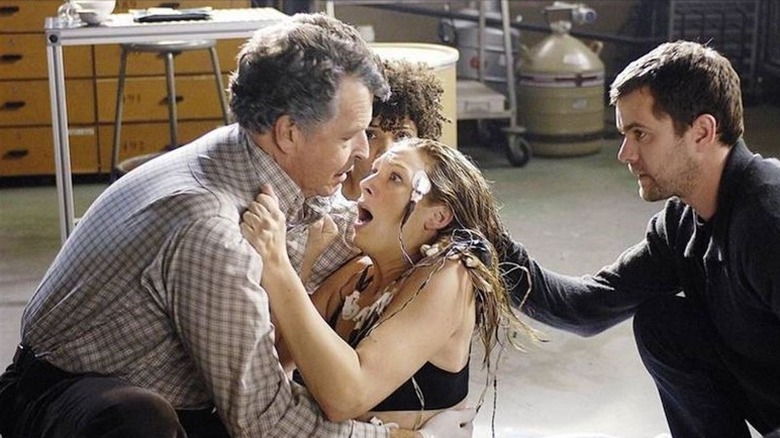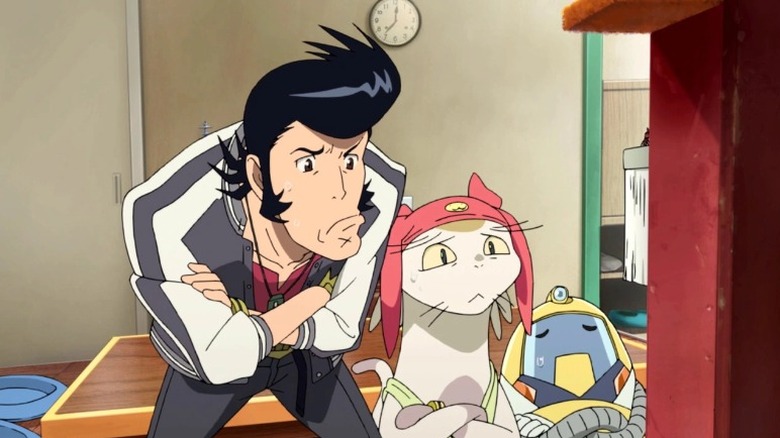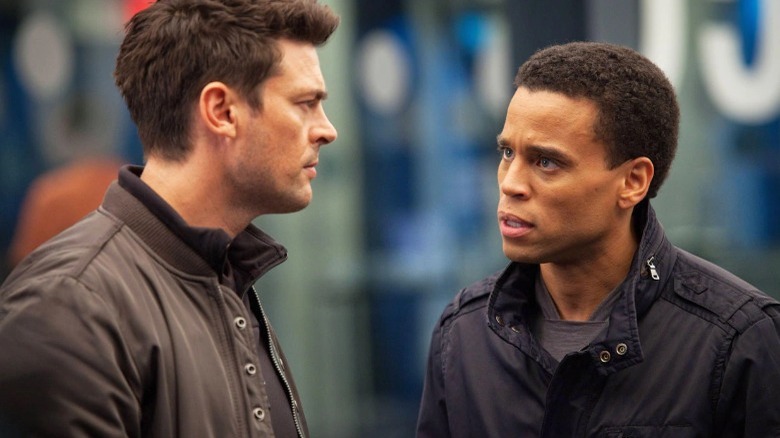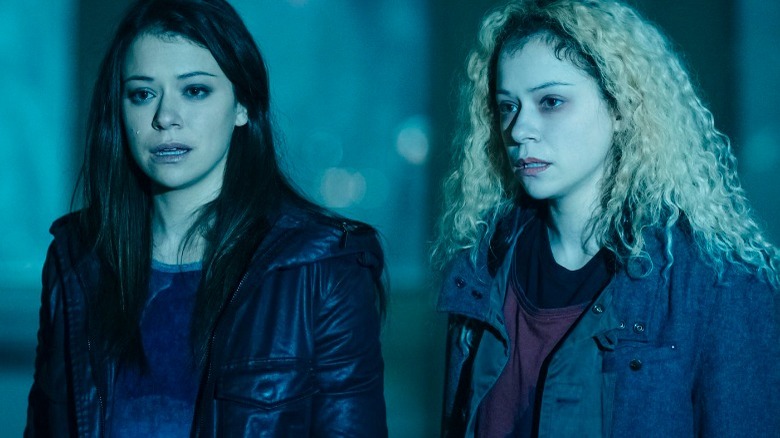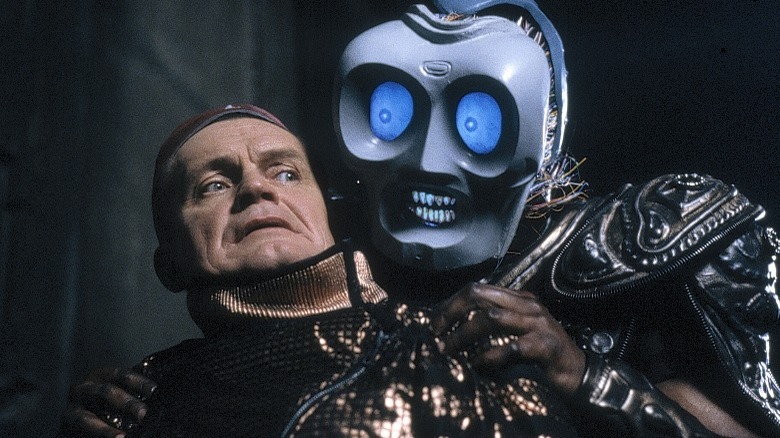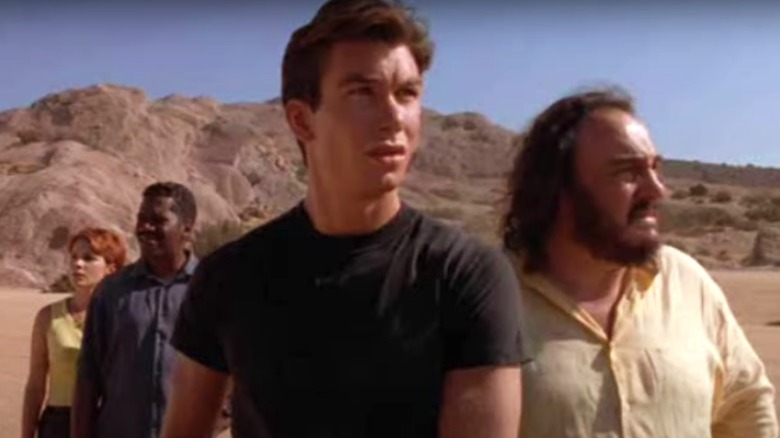12 Underrated Sci-Fi Shows That You Need To See
Science fiction allows us to explore worlds of imagination and possibility, the bigger and the wilder the better. However, the line between smash hit and cult darling is hard to pinpoint, much less cross. The show that doesn't win this blindfolded coin toss is often doomed to go forgotten, its episode order cut short, and its effects budget cruelly slashed just in time to limp to a half-baked finale or worse, a cliffhanger.
It's a fate that often hits this genre harder than others because big concept science fiction shows can look like money pits to studios worried about their bottom line. Money makes it difficult for showrunners to realize their full vision, much less attract strong writers to help them on the way. Despite these hurdles, there are years of great science fiction lurking under an ocean filled with "Star Trek" yachts and waves of reality TV. Of course, not everything that's lost is worth digging back up. So we're doing the work of finding 12 of the best lesser-known science fiction shows that deserve the spotlight.
Hard Time on Planet Earth
Once upon a time, Martin Kove, best known as villainous Sensei John Kreese of "Karate Kid" and "Cobra Kai" fame, could've played the Punisher just as well as Jon Berenthal. With a face like a rock and a gift for the unforgiving stare, Kove playing a likable character would be shocking. How about a half-hour science fiction comedy about an alien convict sentenced to Earth?
"Hard Time on Planet Earth" is a relic of the late '80s, a Disney product loaded with the blatancy of the time — one episode takes place at Disneyland — that flopped like a Magikarp against the Elite Four. Kove plays "Jesse," a traitorous alien prisoner. His sentence includes an observer robot that looks like a pink flying snail. The robot is an idiot. The critics loathed it, which is fair, but that's also not reflective of the show's charm. It's a show ahead of its time that dared to take its absurd premise and have fun with it. Kove does a marvelous job of lampooning his own character type. It's utterly forgotten. It's not even on Disney+, and that's a shame.
V
The 1980s cult sci-fi series "V" includes a two-part miniseries that dares to go as grim as possible with its historical fascist parallels, the three-part "Final Battle" miniseries, and a weekly TV series. The 2009 two-season reboot gave it a good college try, but let's stick with the original. It's overeager with its concept, leaning hard into its evil space lizard Nazis with an enthusiasm that makes the whole thing thrive in spite of itself. With that blatant theme comes a timelessness that overcomes the huge hair and shiny nylon jumpsuits.
It's easier than ever to watch the Visitor Diana (Jane Badler) eat a live rat and think a politician would do it today to get a vote, going on to argue that the woke left is trying to give the eaten rat more rights than their reactionary base. The most astonishing thing about "V" is that the Visitors start by triumphing in terrible, familiar ways. The series goes on to follow the struggle to get Earth back, with all the deaths, setbacks, and terror that come with rebellion. It stumbles hard in places by the end, and it's not on par with "Andor" with its tale of strife and sacrifice, but it remains a lesser-known classic.
Alien Nation
"Alien Nation" is an excellent movie and a pretty good TV series. Both have the same premise: What if "In the Heat of the Night" was about literal xenophobia? The show doesn't try to ascend James Caan's excessively gruff cop, it eventually goes in a different direction — and it works. Matthew Sikes (Gary Graham) starts as tough and bigoted as Caan's iteration but has a lot more time to be drawn into the intricacies of Newcomer life. He's changed by his experiences, forced to recognize them as people. While it's never forgotten that the Newcomers are aliens, by the end, their differences are familiar and welcoming. It's a nice lesson.
George Francisco undergoes a bit of an unavoidable downgrade, going from Mandy Patinkin to Eric Pierpont, but his blander normalcy, again, benefits the character in the long run. "Alien Nation" suffered an early, "Firefly"-style death, but it's also one of the few canceled sci-fi shows to receive an unlikely rescue. Its plot was wrapped up several years later in a series of five TV movies.
Babylon 5
Better known than many of the shows on this list, "Babylon 5" still had the bad luck to be overshadowed by the curiously similar "Star Trek: Deep Space 9." With a fully outlined story mapped to multiple planned seasons, creator J. Michael Straczynski envisioned a grand epic, a science fiction homage to the depth and detail of "The Lord of the Rings."
Astonishingly, it succeeds. Over five seasons, we explore the fifth and last of the Babylon stations. All its predecessors ended in disaster. It's Earth's best chance at preventing another war like the one that nearly obliterated it. It nearly fails at its mission, as a great evil rises from an off-limits world. Against the backdrop of this sprawling drama, the series explores topics still all too relevant like bigotry, fear, and the rise of fascism. It's still beloved by its fans. Straczynski is still pushing for a reboot, put on hold by the buyout of Warner Brothers. Watch the original, streaming on HBO Max in full, and find out why we need more "Babylon 5."
Space Battleship Yamato
Don't turn your nose up at anime. Yeah, there's a lot of iffy stuff shoved out every year, but c'mon, how many cop shows do we need per night in America? Yet, as "The Wire" proves, there's high quality among the glut of police doing police things. Anime has major standouts worth everyone's time. For science fiction fans, the foundational work is "Space Battleship Yamato."
This is one of legendary director Leiji Matsumoto's earliest works, paving the way for his better-known space operas like "Captain Harlock" and "Galaxy Express 999." The Yamato is a lifeboat as much as it is a battleship, the last gasp of humanity. Its mission is to reach the source of a mysterious message offering a way to save an already ruined Earth. Brutal and complex, it's the series that paved the way for the war-scarred mechs of "Gundam" and the wrenching psychological damage of "Neon Genesis Evangelion." Like a lot of early anime, its first visit to US shores was via a mangled localization called "Star Blazers." And like other Japanese classics, "Space Battleship Yamato," with its princesses and planet destroyers, just might've inspired George Lucas more than he wants to admit.
Legion
It was easy to miss one of the best MCU-adjacent shows on television. FX, and by extension, Hulu's few Marvel series never achieved the public awareness of Netflix's offerings, nor did Disney ever throw the power of the Mouse behind them. It's a fate that's ended several excellent shows too early, including "Runaways" and "Cloak & Dagger." However, it's the forgotten "Legion" that may be the most painful sting.
Starring Dan Stevens as David "Legion" Haller, the mutant son of Charles Xavier, the series uses its faint X-Men backdrop to explore mental illness and trauma. David isn't who he thinks he is, nor does he understand what the forces around him want him to be — or even what those forces are sometimes. It's a complex, deeply psychological exploration of one of the franchise's most tormented mutants, a guy who doesn't always understand the impact of the things he's doing. "Legion" needs a fan's full attention for its biggest twists to land with all the import they deserve, and its three seasons tell an entire, if tangled, story. Satisfying and criminally underrated, Dan Stevens deserves his own canon MCU cameo to honor what he accomplished here.
Fringe
"Fringe" is the spiritual descendent of "The X-Files" and deserves to be mentioned in the same breath far more often than it is. As the show opens, the Fringe Division is relegated (with more respect than poor Mulder got) to investigating the wealth of weird crap going on in the world. Like its kin, the anthological nature of these early episodes quietly lays the groundwork for an intricate myth arc, crossing time and multiverses to tell a tale about families and about loving them enough to do anything to save them.
Anna Torv is the heart of the show as Agent Olivia Dunham, a capable investigator with a past she's not initially aware of. With her is an excellent cast that includes the tomato-munchin' Lord Denethor himself, John Noble and Lance Reddick, who uplifts everything he's in, even if it flops. "Fringe" even brings out Leonard Nimoy for one of his best roles, treating him as more than Spock and letting him showcase his complexity and depth as an actor in his final years. With five satisfying seasons, "Fringe" is a bigger — and a banger — and should never be forgotten by sci-fi fans.
Space Dandy
Everybody loves "Cowboy Bebop," the anime sensation that survived a pretty good Netflix live-action adaptation with its rockin' soundtrack intact. However, Shinichirō Watanabe's multiple follow-up series were never going to be "Cowboy Bebop 2: Beboping Harder," and that kept fans from falling as deeply in love with his next projects. "Samurai Champloo" made out alright, but "Space Dandy" goes almost entirely forgotten.
It's a riot of pulp sci-fi tropes, cheesy machismo behavior and all. The titular Dandy is a Han Solo with no child safety features. He's a lech who knows what he likes and spends his free time ogling it at every opportunity. He's also an instinctive physicist, and one of his crew members is a sentient space cat — not that sentience gives them any smarts. Meow has an orange-brown blot on his head, and that's enough to qualify him as the occasional maintainer of the one brain cell all orange cats share. This is not a series for deep thinkers. It's here to have fun, and that's, well, just dandy.
Almost Human
Karl Urban and a cult sci-fi wonder that leaves him hanging ... it's weird that it's happened to him twice. The first is the ultra-violent glory of "Dredd," of course, but the second is a sedate little wonder from the creators of "Fringe" called "Almost Human." At one season of 13 intriguing episodes that showcased a grimy cyberpunk future of androids and ethical dilemmas, it got the "Firefly" treatment, right down to FOX airing episodes out of order.
As Detective John Kennex, Urban gets to serve the best Adam Jensen vibes a "Deus Ex" fan could desire. Kennex didn't ask for this: a 17-month-long coma, cybernetic prosthetics, and his new android partner, Dorian (Michael Ealy). Dorian is the heart of this too-short series, an exemplar of a line of droids that were too human for their makers' comfort. An anthological police procedural, it showcased some great stories. Slain cuties reveal the seediness behind genetic engineering, and a prescient episode with a live-streaming killer (guest-starring David Dastmalchian) are standouts. "Almost Human" was on the cusp of big reveals about its own myth arc when the plug was pulled. Check it out and discover why we're still bitter about its cancellation.
Orphan Black
Tatiana Maslany earned praise for her vibrant charm as Jennifer "She-Hulk" Waters, but she'd long since put in the work to master her brand of whiplash humor. "Orphan Black," a story about a sprawling conspiracy to master cloning, puts Maslany in the center as Sarah Manning, a clone with some unique characteristics. She also plays Beth, the dead cop that sets the series off, and Alison, a twitchy soccer mom ... and Cosima, a research scientist ... and Helena, a religious fanatic ... and Rachel, a clone who works inside the institute behind their genetics program ... and more clones — like, a lot more. You get the point.
Each clone is made distinct, not just in looks but by Maslany's masterful performances. And each one is being hunted down for reasons Sarah is racing to understand. The reasons for her complex new life allow discussions to range from the religious to the ethical. More than anything else, it's a wild ride uplifted by Maslany's performance and smart writing. It's the BBC cult show everyone's heard of by now but hasn't yet watched. It's worth it.
Lexx
Picture it: your living room, late at night, at the end of the '90s. You're flipping through cable channels for something to watch, and there it is, one of the most bizarre things you've ever seen. It's a phallic spaceship that also looks like an incredibly detailed fly's head, and it's full of sketchy people — people that probably shouldn't be on TV. You double-check the channel. It's not some late-night Showtime nonsense. It's the Sci-Fi Channel, and it's something called "Lexx."
There's something compelling about this show, which doles out an actual plot about eternal recurrence and multiversal good and evil in between its boundary-pushing racy set-ups. It features a cast of losers and dead people, most of whom are following their primal desires, not any noble cause. Yet, smartly, it uses this same basic humanity to put its villains on equal footing with their prey. Nothing is sacred in Lexx, not death, not the bathroom, and certainly not chastity. There's nothing else like it. That's probably for the best, but still, it's an experience to be cherished.
Sliders
There's no Time Variance Authority in charge behind the scenes of "Sliders," a series with a premise that would've made He Who Remains throw a fit. A little like Sam Beckett of "Quantum Leap," inventor Quinn Mallory (Jerry O'Connell), and a handful of people who never signed up for this, get lost in an unending parade of parallel Earths.
"Sliders" leaned hardest into the potential of its premise in its first two seasons, with episodes in which Elvis never died and dinosaurs claim San Francisco for their own a year before a Tyrannosaur clawed through San Diego in "The Lost World: Jurassic Park" Worlds of magic and alien invasion awaited the hapless protagonists, and the series earned enough love to survive a hop from Fox to the Sci-Fi Channel. But its rescue also led to a gradual decrease in quality, with iffy scripts and plot devices torn wholesale from popular sources. With a cliffhanger ending and a cast that's long since moved on — Jerry O'Connell is enjoying a well-deserved renaissance as Jack Ransom on "Star Trek: Lower Decks" — the end of the series is bittersweet. It's still a great ride.
